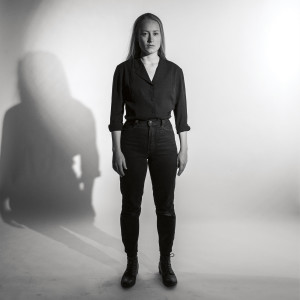 Toronto-based musician Tamara Lindeman records and performs as The Weather Station. This self-titled album is her fourth release under that name, and it’s a bold, self-confident report back from the baffling frontiers of adulthood, relationships, independence, dependence and life in the 21st century.
Toronto-based musician Tamara Lindeman records and performs as The Weather Station. This self-titled album is her fourth release under that name, and it’s a bold, self-confident report back from the baffling frontiers of adulthood, relationships, independence, dependence and life in the 21st century.
Lindeman is a creative guitarist with an idiosyncratic way of singing her songs, which often are seemingly random, rambling streams of consciousness but in reality are tightly constructed prose poems. She often comes off like a modern disciple of Joni Mitchell — complete with swooping vocal lines that jump from alto to soprano in a moment and densely constructed internal monologues — with elements of more modern singers like Aimee Mann and Sam Phillips. Those are all good things in my book.
Lindeman’s core band here consists of herself on mostly electric guitars, a bassist and a drummer, plus a number of guests. This album is her first crack at producing her own record, too, and she also scored the string arrangements that enhance several tracks including one of the standouts, “Kept It All To Myself.” She supplies the jangly guitar on this one, and her string section plays in a portentous, eerie whine that highlights the lyrics about discovering that questions about love don’t go away with adulthood. The title has at least two meanings, too: the way we can hide our deepest feelings even from a loved one, and the way growth often means looking after yourself first. The video emphasizes all of that by depicting the musician as several different versions of herself with one of them, the performer, watching and commenting on the others.
Another real high point is “Thirty,” (which comes with a stylized performance video). It’s an upbeat-seeming fast shuffle that borrows the sunny sounds of ’70s Laurel Canyon folk-rock, complete with psychedelic, meandering flute and a Richard Thompson-esque guitar solo. Thematically, though, it’s not so sunny but rather an emotionally gripping remembrance of artistic awakening and troubling realizations in a relationship.
Sometimes the music and lyrics complement each other, as in “You and I (on the Other Side of the World),” a plodding shuffle with swelling strings that mark the uncertain emotions involved in a long-time relationship that may or may not grow into a marriage. And sometimes the music belies the lyrics, as in “Impossible,” its gently loping rhythm, soulful girl-group backing chorus and jazzy piano chording masking the pain of disagreements and the discovery that one’s own relationship strategies can be less than productive, as in the final verse: “Put no walls around me, I will lay the stones myself, and lay down with my body but give nothing else. Still living with the feeling pent up in my chest, my old lifelong companion, the one I know the best.”
Now that I look at this 11-song track list, I’m inclined to say that two of the above songs, “Kept It All To Myself” and “Impossible” are half of one of the strongest four-song runs on any album you’ll hear this year. The second half comprises “Power,” a plodding indie rocker with a powerful hook played on a downtuned electric guitar and stream-of-consciousness lyrics pouring out from one side of the relationship divide; and “Complicit,” a highly charged mid-tempo rocker with lots of distorted guitar. This one seems to depict the internal conflicts that arise in the soul of an artist who must observe the world on one hand but is conflicted about whether to act on things that need changing. She seems to feel like she’s going on with everyday life while the world ends around her: “And I say nothing, I say nothing at all; I don’t think my voice matters really after all. I was raised to hear the curlews; I was raised to notice light, and I watch the little swallows, delicate in their flight. I trail my hand down through the water of the familiar riverside, for hours in such silence I lay beside—terrified, for knowing in my time, for all the parts per million, for unstoppable design. How can you get over knowing all you know?”
There’s much more, including a Pentangle-like folk-rocker (“Black Flies”), a torchy love ballad (“I Don’t Know What To Say”) and a bittersweet love song about ending up in love seemingly without volition (“The Most Dangerous Thing About You”). The playing, the arrangements and the production are all notable, but what holds it all together is Lindeman’s voice. It’s a superb and engaging instrument, and she’s wielding it with precise and gifted phrasing.
Do check out The Weather Station’s website and Facebook page where you can find videos, lyrics, tour dates and more.
(Paradise of Bachelors, 2017)
